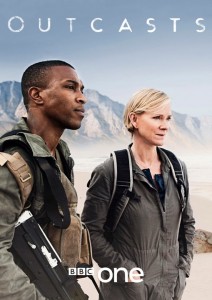Misfits of Science
Feb.11, 2011, filed under Reviews, television
![]() Outcasts is the BBC’s new flagship science fiction drama for the adult audience (I am assuming that Doctor Who remains the flag-bearer for science fiction in general). It follows the various stories of a group of people who are settlers on the planet Carpathia, after some so-far unspecified calamity on Earth made it necessary to evacuate. At the time the series starts the main characters have been there for ten years and the only known surviving transport ship is about to try to land on the surface, bringing with it the last influx of fresh blood the settlers are ever going to see. After this, they are on their own.
Outcasts is the BBC’s new flagship science fiction drama for the adult audience (I am assuming that Doctor Who remains the flag-bearer for science fiction in general). It follows the various stories of a group of people who are settlers on the planet Carpathia, after some so-far unspecified calamity on Earth made it necessary to evacuate. At the time the series starts the main characters have been there for ten years and the only known surviving transport ship is about to try to land on the surface, bringing with it the last influx of fresh blood the settlers are ever going to see. After this, they are on their own.
Carpathia is an Earth-like planet, named after the ship that came to the rescue after the Titanic disaster. No attempt has been made to make the setting seem alien, other than something called a “white-out”, in which presumably tidal forces from the planet’s moon cause what would appear to be a dust storm on steroids. They say it’s something to do with the moon, anyway. In the two episodes so far we have had bad science (aforementioned white-outs and something called deep brain visualisation, in which the subject sits in a special chair and his memories can be seen on the big screen) and good science (an excellent scene in which the teacher was describing the Goldilocks Zone to a class of children). It is therefore not what I would call hard science fiction, as it is the sort of science fiction I can demolish with two diagrams and a joke. A lack of hard science isn’t necessarily a negative criticism, I like soft science fiction as much (and occasionally more than) the next person. However I dislike science fiction that presents itself as hard and then widdles all over itself with hand-waving and dodgy research, not to mention something I saw done in Until the End of the World.
As far as main characters go, I was delighted to see very strong females in the early sections of the first episode. One of the reasons I like science fiction so much is that it has a track record of strong female characters. One of my earliest introductions to strong women was Dayna from Blake’s 7 — an assertive, competent, highly-skilled warrior who took no nonsense from anyone (and whose attractiveness usually took a back seat to the fact that she kicked arse).
Stella Isen, played with usual competency by Hermione Norris, is the Head of Security. Fleur Morgan (Amy Manson) is one of her officers. Both started out well, but Stella’s role quickly became that of the obsessed mother, while Fleur’s maternal instincts were also called upon before the first episode was halfway done when her best friend’s husband went a bit nuts, beat his police officer wife mostly to death, then took off into the wilderness with his son.
At which point my face did this:
So we’ve passed the Bechdel test early and now we’re going to ignore the whole bucking of the gender-bias trend and relax into the girls like babies and boys like guns model. I see.
By episode two the writer, Ben Richards, has made his premise for the series not only perfectly clear by way of storytelling, but also explicit in the dialogue: can humans truly live together in peace? Outcasts is a social pressure-cooker: the problem with it isn’t that this is a bad idea, but that Richards has come to it with the answer already and has arranged everything so that the story can’t fail to produce that answer.
The divisions of labour between the various sub-groups are artificial, counter-productive, and I can’t for the life of me imagine any settlement group on a distant planet trying to work that way. The method of introduction for the various plot points feels like shoehorning them in to serve the underlying premise, rather than things that might have happened and the consequences that ensued. While I enjoy the fact that there is little in the way of unnecessary exposition, I cannot get past the idea that the structure of the society there is implausible and thus everything that happens is difficult to believe on principle.
This is, in short, one of my pet hates: plot driving character, and in this case it extends to the very nature of the community. The desired conflict will not happen without imposing certain conflicts that come across as terribly unlikely with a few moments of thought about how people would actually behave in such an environment.
It is drama. That it takes place on a different planet is simply a device. Even the use of genetic modification is there to define an us-and-them conflict. They could have done the same by punting the characters a couple of hundred years back in time, sticking them somewhere remote and picking some arbitrary differentiation.
So, yes. The only thing that defines this as science fiction is that there are women doing what is usually thought of as a man’s job. It amuses me immensely that writers still find the inclusion of women who are taking on roles traditionally performed by men to be an easy way of saying “LOOK. THIS AM BE THE FYOOOOOTYOOOOOR! IN SPACE!”
But it’s also somewhat tragic.



February 11th, 2011 on 20:22
[…] This post was mentioned on Twitter by Sam Fleming, Sam Fleming. Sam Fleming said: New blog post. In which I review Outcasts: http://bit.ly/fJHkWa […]
February 17th, 2011 on 02:09
I have been watching this. I even knew one of the writers (Jack Lothian) when I was at uni. I am currently ambivalent about it.
I like the setting, the overall ideas, but I strongly dislike the totally stupid character interactions. Episode 4, I’m looking particularly at you. It is like Torchwood but not as bad, good ideas badly executed and some very hammy dialogue which probably looks good on paper but is squirm in your seat bad when spoken. Often poorly. I’m not sure if this is bad acting, poor direction or the actors disbelief they actually have to deliver such trite lines.
I’ll probably keep watching it for now but I’m a masochist. And it might get better. I can always dream.
February 19th, 2011 on 15:14
I’m kind of hoping it will, but seriously, DUDE! If that smarmy religionist type gets any more smarmy he will spontaneously combust, and WTF was all that about in the last episode? Does Fleur strike you as the sort of person who will accept “We thought it was necessary” when it comes to actual physical experimentation on a human being? The longer it goes on the more ridiculous tropes come out and I find myself wanting to beat my head against the wall. If you are going to play to format, at least do something interesting with it.
February 21st, 2011 on 14:50
Episode 4 made almost no sense when it came to character interaction at the end. I think the writer wanted to go down a certain route but the next episode required people to be at a different place.
Things I hated.
If it was so hard to smuggle out the AC, how did she get the AC leader in?
She smuggled the AC leader in yet kept her job?
They AC leader got to leave?
They made up at the end?
I think I might steal the setting for a “Call of Cthulhu in space” game at some point in the future. The set up has potential which the BBC will not develop.
February 21st, 2011 on 15:10
Didn’t they get in the leader plus three cronies with tranq darts? It was all a bit confused by then. And, what, this is the year Gazillion but we’re still expected to believe that pseudo-religious fundamentalism is a primary motivator for people accepting messages of hate? For putting someone who preaches messages of hate in a position of authority? For putting someone on the board who preaches messages of hate while being an obvious two-faced, slimy fecker who might as well grow a long moustache and twirl it while cackling?
The more I think about it the more I want to beat my head against the nearest dustbin lid while saying a prayer to Ted Rogers.
February 21st, 2011 on 18:44
She went out with a flare gun to contact him, then the plot magically skipped to inside.
The religion thing is related to a long journey (10, 15 years?) alone in space. And maybe a bit of a Ron L. Hubbard thing too. Putting him on the council though is a strange choice, only made to advance the plot rather than for rationally well thought out reasons. If they spend a few scenes showing how many followers he had, they could have justified it but they didn’t. Lazy/rushed plot development since they are obviously working towards an evil coup. Yet they can spend far too long showing Tipper’s memories of his sisters. Meh.
I think it is supposed to be near future rather than gazillion years future. Because in the future soldiers are armed with SA80s painted white.
The more I think about it the more it annoys me. I’ve got a list of changes I would make to Cthulhu-ify it and the more I think, the better it could be.